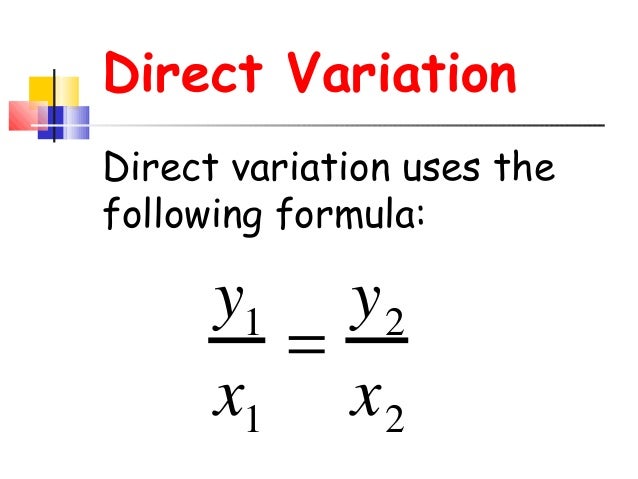

Use this translation if the constant is desired. Yx = k for some constant k, called the constant of proportionality. The phrase “ y varies inversely as x” or “ y is inversely proportional to x” means that as x gets bigger, y gets smaller, or vice versa. If y varies directly as x, and y = 10 when x = 7, find y when x = 12. If y varies directly as x, and y = 10 when x = 7, find the constant of proportionality.

This translation is used when the desired result is either an original or new value of x or y. This translation is used when the constant is the desired result. The k is called the constant of proportionality. That concept can be translated in two ways. The phrase “ y varies directly as x” or “ y is directly proportional to x” means that as x gets bigger, so does y, and as x gets smaller, so does y. Checking to see if is a solution is left to you. However, x = 4 is an extraneous solution, because it makes the denominators of the original equation become zero. More involved proportions are solved as rational equations. Simple proportions can be solved by applying the cross products rule.
DIRECT VARIATION EQUATION CALCULATOR HOW TO
This section defines what proportion, direct variation, inverse variation, and joint variation are and explains how to solve such equations.Ī proportion is an equation stating that two rational expressions are equal. Proportion, Direct Variation, Inverse Variation, Joint Variation


Quiz: Proportion, Direct Variation, Inverse Variation, Joint Variation.Proportion, Direct Variation, Inverse Variation, Joint Variation.Quiz: Adding and Subtracting Rational Expressions.Adding and Subtracting Rational Expressions.Quiz: Trinomials of the Form ax^2 + bx + c.Quiz: Trinomials of the Form x^2 + bx + c.Quiz: Adding and Subtracting Polynomials.Quiz: Linear Equations: Solutions Using Determinants with Three Variables.Linear Equations: Solutions Using Determinants with Three Variables.Quiz: Linear Equations: Solutions Using Matrices with Three Variables.Linear Equations: Solutions Using Matrices with Three Variables.Linear Equations: Solutions Using Elimination with Three Variables.Quiz: Linear Equations: Solutions Using Elimination with Three Variables.Quiz: Linear Inequalities: Solutions Using Graphing with Two Variables.Linear Inequalities: Solutions Using Graphing with Two Variables.Quiz: Linear Equations: Solutions Using Determinants with Two Variables.Linear Equations: Solutions Using Determinants with Two Variables.Quiz: Linear Equations: Solutions Using Matrices with Two Variables.Linear Equations: Solutions Using Matrices with Two Variables.Quiz: Linear Equations: Solutions Using Elimination with Two Variables.Linear Equations: Solutions Using Elimination with Two Variables.Quiz: Linear Equations: Solutions Using Substitution with Two Variables.Linear Equations: Solutions Using Substitution with Two Variables.Quiz: Linear Equations: Solutions Using Graphing with Two Variables.Linear Equations: Solutions Using Graphing with Two Variables.Quiz: Slopes of Parallel and Perpendicular Lines.Slopes of Parallel and Perpendicular Lines.


 0 kommentar(er)
0 kommentar(er)
